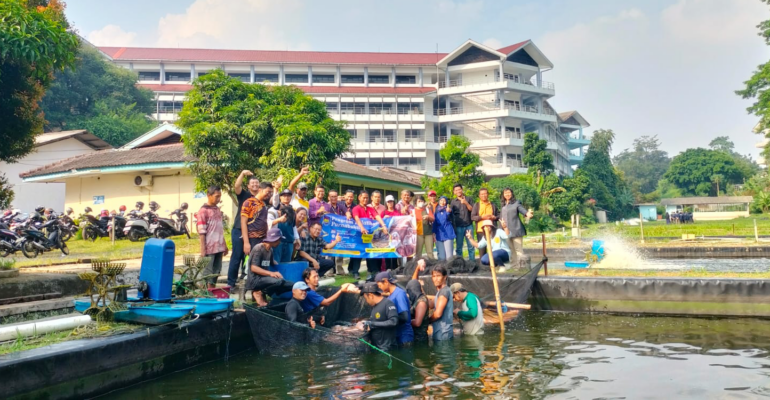TNC IPB University Organizes Tilapia Hatchery and Enlargement Training for Retired BPK Penabur Teachers

Tani and Nelayan Center (TNC) IPB University held a training on tilapia hatchery and enlargement with Yayasan Badan Pendidikan Kristen (BPK) Penabur. This activity also collaborated with the Department of Aquaculture (BDP), Faculty of Fisheries and Marine Science (FPIK) IPB University. The training was held in the classrooms and Experimental Ponds of BDP FPIK.
Vice Chairman of TNC IPB University, Dr Roza Yusfiandayani welcomed the arrival of retired BPK Penabur teachers to learn about tilapia hatchery and enlargement. In her speech, she introduced several IPB University innovations from Dr Agus Oman Sudrajat, namely Oodev, Oocyte Developer, and Maturation Inducing Premix Hormone.
“Participants gain knowledge and practical skills in tilapia hatchery and enlargement techniques, so they are able to apply the knowledge in the field. In addition, it is expected that the productivity of tilapia farming can increase, both in terms of the number and quality of fish produced, in order to maintain food security,” said Dr Roza.
The training was delivered by Dr Agus Oman Sudrajat, Dr Mia Setiawati, and Yudha Hanggara, SPi. The training was divided into two sessions: a material session and a hands-on session. A total of 22 participants were taught tilapia hatchery and enlargement techniques directly in the BDP Experimental Pond of FPIK IPB University.
“The specialty of tilapia is that it has a good taste, relatively cheap price, high nutritional content, fast growth, easy to breed, tolerant to the environment, relatively resistant to disease, and can be maintained in almost all cultivation containers,” said Dr Oman.
He added, “Tilapia farming can create jobs, increase income, improve business capabilities, improve community nutrition, and is one way to maintain food security.”
Furthermore, participants were invited to participate directly in tilapia hatchery and rearing practices. This practice includes how to give Oodev, Oocyte Developer, and Maturation Inducing Premix to fish by injection.
“Participants were also trained to make fish feed, identify differences between male and female tilapia, learn how the biofloc system works, and feed the fish directly in the BDP Experimental Pond of FPIK IPB University,” said Yudha Hanggara.
Christian Widodo, one of the assistants, thanked TNC IPB University for the opportunity to learn in this training. He hopes that this training can provide new insights for retired BPK Penabur teachers to start tilapia farming activities. (TNC/Rz) (IAAS/Ard)



